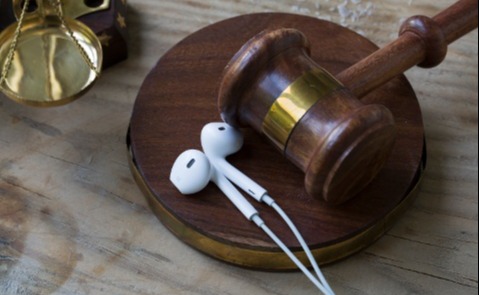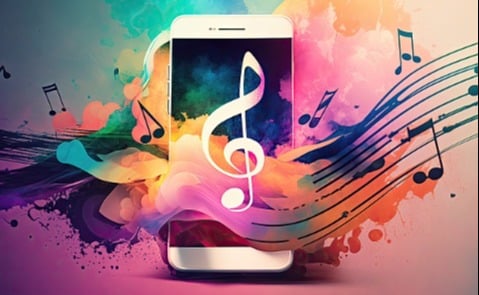
Streaming services such as Spotify and Apple Music have become incredibly popular in recent years, due in part to their vast libraries of commercial music.
But how do these streaming services get the rights to stream all that music? And what happens when a song is played on these services?
To stream music on services such as Spotify and Apple Music, the streaming service must first obtain a licence from the copyright owner(s) of those song libraries. This process can be quite complex and lengthy, as the terms of the licence need to be negotiated between the copyright holder and the streaming service.
Some of the things that may be included in a music licensing agreement include the length of the licence (term), the territories (single or multi-territories) in which the music will be streamed, and the amount of royalties that the streaming service will pay to the copyright holder(s).
For a music streaming service, there are usually 3 main sets of rights obtained:
- Master Rights (Record Labels)
- Publishing Rights (Song composers, writer contributors etc)
- PRO Rights (Performance Rights Organisations (public broadcasting))
What is music licensing and why is it necessary?
Music licensing is a process by which a copyright holder grants permission under a licence to use their intellectual property in a specific way.
In the case of streaming services, this means that the copyright holder allows their music to be streamed by the service. The terms of the licence are usually worked out between the copyright owner and the streaming service. Without a licence, streaming services would be liable for copyright infringement and face large fines and bad publicity.
If you are a copyright holder who wants to license your music to streaming services, or if you are a streaming service that needs to obtain licences for the music you offer, it is advisable to seek the help of an experienced music licence strategist or music attorney.
Which type of music licences should you obtain for your streaming service?
When streaming music, it is important to obtain the appropriate licences from the copyright holders.
There are a variety of licences available and the type of licence you need depends on the type of music streaming service you offer. Only a few of the many different types of licences may be necessary for your music streaming service.
The 3 most common types of music licences for streaming services are the master rights, the publishing rights and the public performance licence.
- Master rights
The master rights are the rights to the actual recording of a song. They include the right to reproduce, distribute, and perform the song. Master rights are typically owned by the artist or record labels such as Universal Music Group, Warner Music Group, Sony Music, Believe etc. - Publishing rights
The publishing rights are the rights to the song itself, including the melody, lyrics, and arrangement. Publishing rights are typically owned by the songwriter or composer. Examples of publishing companies include Warner Chappell Music, Kobalt, Universal Music Publishing, and Sony ATV. Companies such as HFA (Rumblefish, Harry Fox Agency), MRI (Music Reports INC) or Crunch Digital can help you navigate this space as well, as they offer packaged services to manage the direct relationships and royalties management for a plethora of worldwide music publishers. - Performance rights
The performance rights are the rights to perform a song publicly. This licence is required when your streaming service offers a live stream or when users can listen to music on demand. Performance rights are typically administered by PROs - performing rights organisations - such as ASCAP, BMI, and SESAC in the United States, SACEM in France or APRA AMCOS in Australia. These organisations collect royalties on behalf of copyright holders and then distribute those royalties to the copyright holders. They are specific to each country.
When obtaining a public performance licence, you will need to negotiate a fee with the PRO. The PRO will then issue a blanket licence, which allows you to play any song in their catalogue.
There are a variety of other licences that may be necessary depending on the type of music streaming service you offer.
If your streaming service offers videos that include copyrighted music, it is also important to obtain a synchronisation licence. This includes YouTube videos, videos played on Social Media platforms, TV shows, and movies but also online digital workouts for fitness companies.
A good example of the importance of sync licensing is Peloton and their use of music.
If you offer karaoke tracks, you will need to obtain a karaoke licence.
If you want to display lyrics you will have to licence them. And if you stream music from video games, you will need to obtain a game synchronisation licence.
Each type of licence has its own set of rules and regulations, so it is important to consult a lawyer or music industry professional to ensure that you are in compliance with all applicable laws.
How does a streaming service obtain a licence to stream music?
To acquire a licence to stream music, a streaming service needs to talk directly to the copyright holders of the music that they want to stream.
The copyright holders can be individual songwriters, record labels or the owners of music publishing companies. The streaming service will need to negotiate a licence agreement with the copyright holder and may need to pay royalties for the use of the music. Once a licence agreement is in place, the streaming service will be able to stream the music according to the terms of the agreement.
To find out who the copyright holder is, you can look up the song on a copyright website like the US Copyright Office or UK Copyright Service. You can also contact the Harry Fox Agency, MusicReports (INC), Crunch Digital, or Blokur.
In some cases, for a single territory launch, there could be a singular copyright organisation in your country.
The terms of the licence agreement between a streaming service and a copyright holder will determine how the music can be used by the streaming service.
What are some of the terms that are typically negotiated in a music licensing agreement?
When a streaming service negotiates a licence agreement with a copyright holder, they will typically agree to the following terms:- The music can be streamed in certain countries. Worldwide licence requirements can also be managed and negotiated directly with copyright owners.
- The music can only be streamed for a certain period of time (term of agreement).
- How much royalties the streaming service will pay the copyright holder for the use of the music. It can include a percentage of your paid subscriptions, as well as cost per stream, and a minimum revenue guarantee amount.
In some rare cases, the copyright holder may agree to let the streaming service stream the music for free, in exchange for promotional considerations. For example, the copyright holder may agree to have their music featured prominently on the streaming service's homepage.
Make sure to keep track of which licences you have obtained and when they expire so that you can renew them as needed.
Do you need an entertainment lawyer to assist you?
No, you don't need a music attorney to assist you with music licensing, but it is highly recommended and helpful to have someone who is familiar with the process.
The licensing agreement between a streaming service and a copyright holder can be complex, and there are many things that can go wrong if it isn't negotiated correctly.
An entertainment lawyer or a music licensing consultant can help make sure that everything is done correctly and can provide valuable advice on how to negotiate the best possible deal.
Look at music licensing experts who have been working in the music industry for some time. You want them to have experience negotiating licensing agreements between streaming services and copyright holders, and know what to look for to make sure that both parties are getting the best deal possible.
---
When it comes to streaming music, having the appropriate licences in place is essential.
Copyright holders can sue streaming services for using their music without a licence, and the penalties can be significant.
To avoid any legal trouble, it is best to err on the side of caution and obtain all necessary licenses before streaming any copyrighted material.
While you don't need an entertainment lawyer to help you with music licensing, it can be helpful to have someone familiar with the process.
An experienced lawyer can make sure that everything is done correctly and can provide valuable advice on how to negotiate the best possible deal.
Photo credits: Adobe Stock



